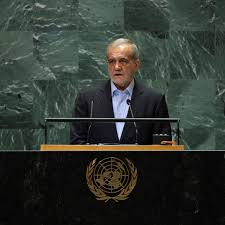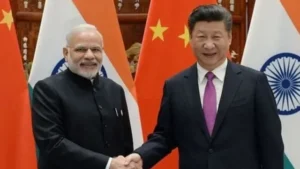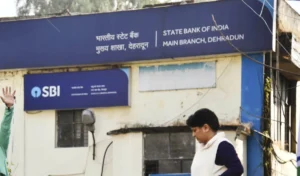NEWYORK—23September2024—WhenIran’s new president Masoud Pezeshkian arrives at the United Nations, he will travel on the waves of promises and appeals he has made to the Iranian people over the past several months.
Iran’s civilization was a “valuable heritage,” he said, during the summer presidential election campaign, but it is “struggling with big challenges and issues” and “opening these knots and solving the issues facing the country is not possible except with the cooperation and participation of each and every citizen of Iran.”
Dr. Pezeshkian specifically promised that his administration would respect the rights of Iran’s ethnic and religious minorities.
And as recently as this last week, for instance, on 16 September, Dr. Pezeshkian said at a press conference in Tehran that “everyone living in this country has the right, based on their abilities, to be placed in the position they deserve … You cannot insult what I worship, you cannot disregard and ignore that belief. Mutual respect and dialogue are key principles of development.”
The president also said “People are equal like the teeth of a comb. There is no difference between one race and another.”
Yet the gulf between rhetoric and reality remains as vast as ever in the Islamic Republic—especially on the persecution of the Baha’is.
“We would like to view President Pezeshkian’s statements with optimism, but based on past and current experience, we will be watching his actions more than listening to his words,” said Simin Fahandej, Representative of the Baha’i International Community (BIC) to the United Nations in Geneva.
“There has been no alignment of promises yet with actual reality on the ground, and the evidence of constant and worsening persecution is too great to ignore,” Ms. Fahandej added. “Every past Iranian president has made similar promises of a more equal society in Iran, but the Baha’is in that country face the same ever present, cradle to grave persecution, regardless of who is in power. The Iranian government aims to eradicate the Baha’i community as a viable entity in the country. It discriminates against the Baha’is in its constitution and in all its major laws and policies, and has issued official government edicts specifically dealing with the ‘Baha’i question’. Dr. Pezeshkian’s challenge will be to remove the many barriers that prevent the Baha’is from living in Iran as equal citizens.”
Dr.Pezeshkian’s words: Relations between Iranians from “different ethnicities and religions through cultural and artistic dialogues” should be “strengthened.”
○ Thereality: In August, a long-running and grossly unjust case of 10 Baha’i women, in Isfahan, took its latest turn when the women appeared before a Revolutionary Court and were accused of “promoting Baha’i beliefs” after running classes of English language instruction, music, yoga, and painting toadolescents, children, and Afghan migrants in the city. The charges arise from private complaints secured by government agents who have coerced neighbors of the Baha’is with threatening phone calls and court summonses. The 10 women have also already been, in effect, declared guilty even though the trial continues.
Dr.Pezeshkian’s words: “The concept of free thinking does not mean … [a person should be] expelled from university, or fired from [their] job. We must open our minds so we can come together.”
Thereality: Thousands of Baha’i youth have been cruelly and systematically excluded or expelled from Iranian universities for over four decades, including the most recent group of intending Baha’i students in the past month. In the last two months Baha’is were banned from a technical course at Shahid Beheshti University in Tehran as a continuation of the Iranian government’s policy to bar all Baha’is from higher education. This summer alone, the BIC learned that two music teachers in the city of Qaemshahr were expelled from their jobs after the Ministry of Intelligence, which reports to President Pezeshkian, threatened their employer. A Baha’i business owner in Shiraz was also threatened by security agencies after closing his plumbing reseller on Baha’i holy days. And agents raided numerous homes of Baha’is in Kerman and Shiraz and confiscated property.
Dr.Pezeshkian’s words: Iran’s government and people should make “maximum effort in promoting social justice” and the “citizenship status” of “ethnic groups and religions”. ○ Thereality: In the past month several Baha’is have been arrested, their families denied information as to their loved ones’ location or well-being, and young children have been separated from their mothers. One mother’s home, in Shiraz, was searched and she was arrested even in the presence of her two-year-old child. Asecond mother of a four-year-old, in Tabriz, was arrested despite her father’s hospitalization in intensive care. And a Baha’i man, whose brother recently passed away, was arrested and detained even though his family asked for the arrest to wait at least until after the funeral. Two Baha’i women, meanwhile, one in Fardis and another in Urmia, were arrested by intelligence agents; the belongings of one were seized, the other was denied bail, and both remain in prison without due process.
Dr.Pezeshkian’s words: Attention should be given to Iranians’ “citizenship rights,” not their “linguistic and religious differences.” ○ Thereality: The BIC has noted, with alarm, fresh instances of the Iranian government’s ongoing effort to “cleanse” Iran of Baha’i history and identity with an arson attack by unknown assailants at a Baha’i cemetery in Ahvaz, as well as tensions in Kashan over the burial of a Baha’i resident. Tehran’s Baha’i cemetery has been blocked to Baha’is for years by Ministry of Intelligence agents who have buried deceased Baha’is without proper burial rites, against the knowledge of their families, and atop mass graves where thousands of 1980s political prisoners were interred.
Dr.Pezeshkian’s words: “It is God’s command that says you should act in a way that enables you to hear all ideas and follow the best one. This is possible in dialogue. It does not mean that we should insist, saying, ‘This is what we said, and you have no right to speak.’” ○ Thereality: Prison authorities at Tehran’s Evin Prison have denied the internationally-recognized Baha’i woman, Mahvash Sabet, all phone calls and family visits. Mrs. Sabet is one of seven former Baha’i leaders in Iran, jailed between 2008 and 2018, who is now in the third year of a fresh 10-year sentence.









